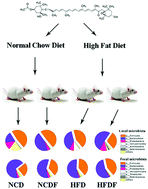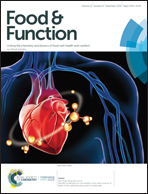Fucoxanthin modulates cecal and fecal microbiota differently based on diet
Abstract
Obesity is a major health concern worldwide and is considered to be associated with disruption of host-microbial homeostasis, especially microbiota composition in the gastrointestinal tract. Use of microbiota-directed foods or nutraceuticals therefore represents a promising approach for the control of obesity. Fucoxanthin, a marine carotenoid, has been proven to be one of the most effective anti-obesity natural products. However, its action mechanism is yet to be unraveled, especially with respect to its role in the modulation of gut microbiota composition. In the present study, profiles of microbiota in both the cecal and fecal samples from BALB/c mice given respectively the following treatments were examined: normal chow diet (NCD), NCD + fucoxanthin (NCDF), high-fat-diet (HFD), and HFD + fucoxanthin (HFDF). The results showed that fucoxanthin supplementation for 4 weeks significantly changed the composition of both cecal and fecal microbiota. In addition, a differential effect was observed between the supplementation to NCD and to HFD. The changes in the Firmicutes/Bacteroidetes ratio and the abundance of S24-7 and Akkermansia were identified to be among the major gut microbiota modulating events associated with the anti-obesity bioactivity of fucoxanthin. Hence, our results suggested that fucoxanthin could be a promising microbiota-targeted functional-food ingredient.



 Please wait while we load your content...
Please wait while we load your content...